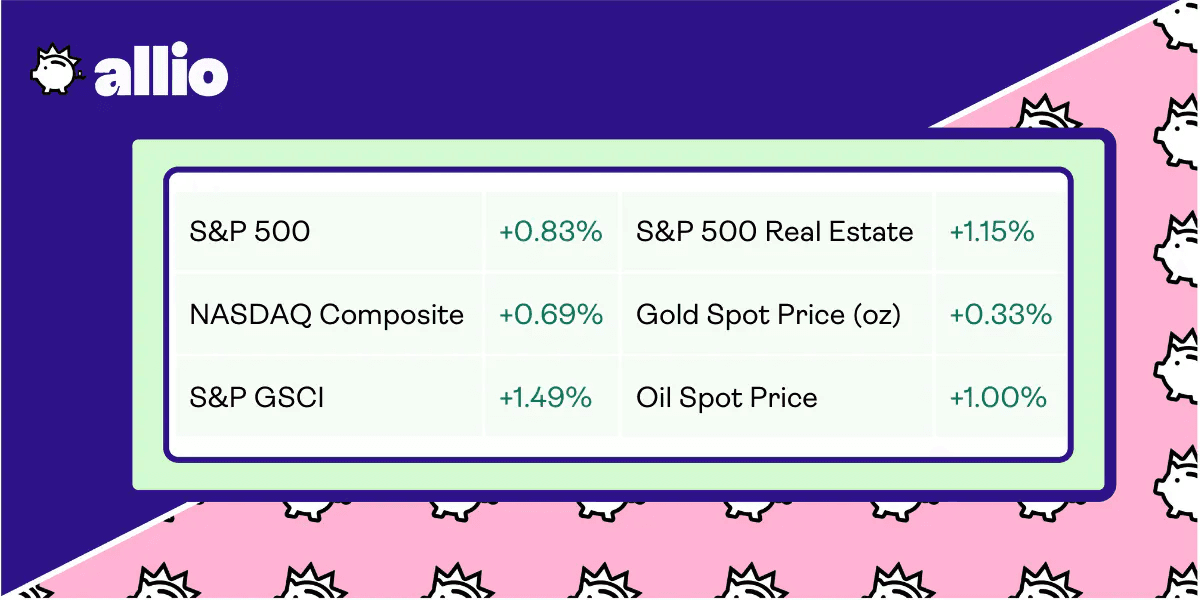Updated May 1, 2023

Bill Chen, CFA
The Piggy Bank
THE MARKETS
📈 U.S. stocks finished the week broadly higher. The Nasdaq 100 led the gains, up nearly 2% on the back of Microsoft and Meta earnings reports.
Investor expectations were fairly low heading into a week featuring earnings reports from some of America’s biggest technology companies. The industry has laid off nearly 170,000 employees so far in 2023 — which, depending on your view, is either a negative indicator for the health of the business, or an indication of cost-cutting discipline necessary to adapt to a new economic reality.
Most of America’s tech companies beat expectations, proving business is still booming in cyberspace.
Amazon posted a beat on revenue growth thanks to its growing ad business.
Meta reported its first quarterly sales growth in a year and confirmed its ad business is still going strong, despite growing concerns.
Microsoft said its new ChatGPT-powered Bing search engine eclipsed 100 million users, and highlighted growing sales from the rest of its business. However, Microsoft’s acquisition of Activision Blizzard was put on hold by European regulators.
Google reported revenue growth above analyst expectations, despite lagging ad sales from YouTube.
In other news, LVMH became the first European company to reach a $500 billion market cap. The luxury goods powerhouse — which owns Hennessey, Louis Vuitton, and Fendi, among others — has profited from a post-pandemic spike in luxury spending.
Norfolk Southern, the company now infamous for its February train derailment, reported its most recent quarterly report. The spill will reportedly cost the company around $387 million, or roughly 12% of the transportation company’s 2022 profits.
Finally, fans of privacy can breathe a small sigh of relief. ChatGPT’s owner, OpenAI, has stated users can now opt out of having their prompt history saved. To date, OpenAI has tracked search queries and used them to train their language model.
💼 Economic Data
Despite the rapid increases to the interest rate, inflation remains concerningly high. This past week, the PCE Index, an inflation metric closely watched by the Fed, rose 0.3%. Although this was in-line with economist expectations, the economy still has a long way to go to reach the Fed’s 2% inflation target.
In non-inflation news, the House of Representatives passed a bill to raise the US debt ceiling. The proposed bill, which would raise the ceiling from $31.4 trillion, reportedly has “no chance” of being passed by the Senate or the Biden administration.
👀 What to Be on the Lookout for This Week
This week will be jam-packed with more earnings, as hundreds of companies are set to report. Most notably, be on the lookout for reports from:
Starbucks
Uber
Ford
CVS
Yum! Brands
Apple
Moderna
Block
AMC
In addition to a busy week of earnings, the JOLTS report will be released for March. In February, the number of open jobs in the US fell by 632,000 to 9.9 million. This could be a sign that widespread layoffs in the tech sector are finally catching up with the overall labor market.
Finally, on Wednesday, the Federal Reserve has to make another crucial interest rate decision. Many Fed members are still concerned inflation is too high and lean toward raising rates a few more times before 2023 is over. If this happens, it could lead to higher costs for loans and could potentially even tip the US into recessionary territory.

Reflects performance at market close 4/28/23
YOUR ECONOMY
🏡 Good Credit Might Lead to a… Higher Mortgage?
The Details
In a strange role reversal, a new federal rule might actually make it more expensive for people with higher credit scores to get mortgages.
This new rule states that homebuyers with a credit score of 680 or higher will have to pay an additional $40 per month when taking out a mortgage of $400,000. Assuming a mortgage of 30 years, this would cost homebuyers an extra $480 per year and $14,400 over the term.
Those who plan to put down 15% to 20% when purchasing their home will reportedly experience the biggest spike in mortgage costs. The new rule is set to take effect May 1, 2023.
The Reasoning
Credit scores are a metric of how trustworthy you are as a borrower and how likely you are to repay a loan. Having a high credit score means you have a history of repaying your debt on time. On the other hand, a lower score means you pose a potential risk to lenders.
Historically, borrowers with higher credit scores are typically rewarded with lower interest rates. Lenders know they are likely to get repaid in full, so they are comfortable extending a reducing rate. Now, this new federal rule will penalize those with higher credit scores by weaving additional fees into their mortgage payments.
The main reasoning behind this move is to subsidize the cost of a mortgage for those with lower credit scores. The end goal is to support federal initiatives to help increase access to affordable housing across the country. However, housing experts are concerned it will only make a formidable housing market more difficult to navigate.
Navigating a New Market
This new rule comes at an inopportune time for homebuyers.
Mortgage rates have more than doubled in the past year alone. The current mortgage rate sits around 6.5% after starting 2022 close to 3%. These rate hikes were intended to bring down the cost of housing. However, despite the increase in mortgage rates, home prices remain historically high and largely unaffordable in many areas of the country. New homebuyers are facing rising home prices and steep competition.
With these conditions in mind, experts at Zillow recommend preparing to move quickly once you find a home you like. In other words, if you find a home that checks the boxes at a rate you can afford, be prepared to pounce on it. With inventory low and competition high, expect others to move quickly, too, and anticipate a bidding war to ensue once you extend an offer.
Finally, when you start looking for a new home, it can be beneficial to get pre-approved for a mortgage. Not only will this allow you to make an offer and close quicker, but it also prevents you from spending more on a new home than you can afford. However, keep in mind mortgage pre-approvals typically only last for 30 to 90 days. So, be prepared to start your home hunt as soon as you’ve gotten your pre-approval.
We are currently living through one of the most difficult housing markets in recent memory. But a little preparation — and a lot of persistence — can still make your dream home a reality.
And in our opinion, home ownership still beats renting for Gen Z. Here's why...

👜 “Quiet Luxury” Is Back in Style
What’s Quiet Luxury?
“Quiet luxury” — also known as “stealth wealth” — is a trend that has taken over the fashion world in the past few months. It is best described as dressing in clothes that are as understated as they are expensive.
Traditionally, high-end clothing typically features gaudy designs, bright colors, and loud logos. Think Louis Vuitton logo-laden purses or belts with big Gucci buckles. Quiet luxury, on the other hand, swaps the oversized designer branding in exchange for more subtle (yet equally expensive) clothing.
Specifically, quiet luxury tends to use muted tones of beige, gray, and brown. It is also almost always logoless. Stealth wealth is essentially the clothing equivalent of leaving the yellow Lamborghini at home and opting for the all-black Bentley instead.
Back in Style
To better understand the stealth wealth trend, let’s go back to 2021 for a moment.
In 2021, pandemic restrictions had just ended and people were finally free to travel and visit with friends after more than a year of quarantining. Many also found themselves flush with cash from stimulus payments and a roaring stock market. During this period, “peacocking” — or wearing clothing with bright colors and loud prints — became very popular. But much has changed since then.
So far through 2023, layoffs and downsizing have plagued multiple industries. In particular, nearly 170,000 workers have lost their jobs in the tech sector alone — more in four months than the total in 2022. On top of that, many economists believe the US is on the brink of a recession. Taking all of this into account, it’s no wonder it’s considered tone-deaf to strut around in Gucci or Prada. So, instead, America’s wealthy have turned to quiet luxury.
Like most fashion trends, this isn’t the first time that quiet luxury has surged in popularity. The last time the fashion world went stealthy was in 2008, right after the Great Recession.
The stealth wealth movement has also been fueled by popular shows like Succession. Its cast of characters are routinely adorned in subtle signs of extreme wealth, like a $600 baseball hat.
Getting in on Quiet Luxury
For those looking to ride the latest fashion wave, experts recommend Loro Piana and Brunello Cucinelli as two of the best brands to buy. Of course, that’s assuming a $1,700 cashmere sweater is within budget.
For quiet luxury on the more budget-friendly side of things, check out brands like M.M.LaFleur, Jenni Kayne, Quince and Everlane. These companies offer understated and high-quality clothing at an affordable price.
And even for people with no interest in fashion trends, it’s still worth taking note of stealth wealth as an indicator of America’s economic health. In other words, the next time you notice people walking around with huge Ralph Lauren logos on their shirts, it might be a sign the economy is improving.
POCKET CHANGE
Inflation is hitting Gen Z hard—with two-thirds of adults 26 and younger reporting living paycheck to paycheck; an 8-percentage-point increase from last year.
Voice memos are becoming an increasingly popular way to communicate, thanks to the nuance and authenticity they convey. Audio messages can be sent using iMessage, WhatsApp, Slack, and even the dating app, Hinge.
LVMH has become the first European company to surpass $500 billion in market cap. The owner of Louis Vuitton, Hennessey, Givenchy, and more will likely continue to grow as China rolls back its pandemic lockdowns.
General Motors plans to discontinue its popular Chevy Bolt. This decision was made due to the electric vehicle’s outdated battery cells, as well as the automaker’s preference for SUVs and pickup trucks.
According to information from Glassdoor, some internships can pay as much as $9,000 per month. Top-paying companies (in order) include Stripe, Roblox, Nvidia, Coinbase, and Meta.
Bed Bath & Beyond has filed Chapter 11 bankruptcy and will begin closing its 360 remaining stores. Meanwhile, discount chains like Five Below and TJX stores are standing by to scoop up the now-vacated real estate.
Ready to build wealth on autopilot? Head to the app store and download Allio today!
Related Articles
The articles and customer support materials available on this property by Allio are educational only and not investment or tax advice.
If not otherwise specified above, this page contains original content by Allio Advisors LLC. This content is for general informational purposes only.
The information provided should be used at your own risk.
The original content provided here by Allio should not be construed as personal financial planning, tax, or financial advice. Whether an article, FAQ, customer support collateral, or interactive calculator, all original content by Allio is only for general informational purposes.
While we do our utmost to present fair, accurate reporting and analysis, Allio offers no warranties about the accuracy or completeness of the information contained in the published articles. Please pay attention to the original publication date and last updated date of each article. Allio offers no guarantee that it will update its articles after the date they were posted with subsequent developments of any kind, including, but not limited to, any subsequent changes in the relevant laws and regulations.
Any links provided to other websites are offered as a matter of convenience and are not intended to imply that Allio or its writers endorse, sponsor, promote, and/or are affiliated with the owners of or participants in those sites, or endorses any information contained on those sites, unless expressly stated otherwise.
Allio may publish content that has been created by affiliated or unaffiliated contributors, who may include employees, other financial advisors, third-party authors who are paid a fee by Allio, or other parties. Unless otherwise noted, the content of such posts does not necessarily represent the actual views or opinions of Allio or any of its officers, directors, or employees. The opinions expressed by guest writers and/or article sources/interviewees are strictly their own and do not necessarily represent those of Allio.
For content involving investments or securities, you should know that investing in securities involves risks, and there is always the potential of losing money when you invest in securities. Before investing, consider your investment objectives and Allio's charges and expenses. Past performance does not guarantee future results, and the likelihood of investment outcomes are hypothetical in nature. This page is not an offer, solicitation of an offer, or advice to buy or sell securities in jurisdictions where Allio Advisors is not registered.
For content related to taxes, you should know that you should not rely on the information as tax advice. Articles or FAQs do not constitute a tax opinion and are not intended or written to be used, nor can they be used, by any taxpayer for the purpose of avoiding penalties that may be imposed on the taxpayer.


